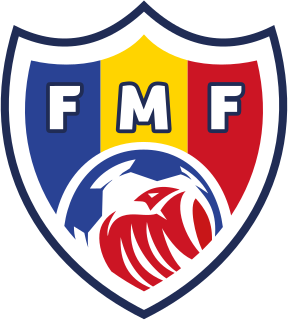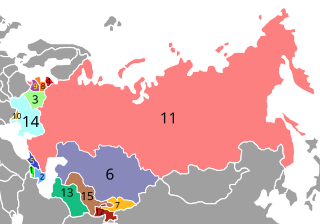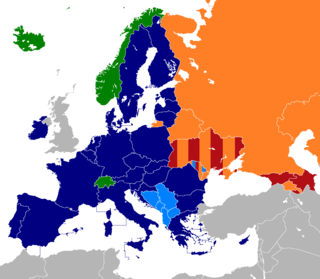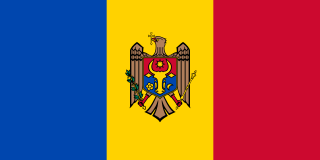Related Research Articles

The Commonwealth of Independent States (CIS) is a regional intergovernmental organization of nine members, plus two founding non-member, post-Soviet republics in Eurasia. It was formed following the dissolution of the Soviet Union in 1991. It covers an area of 20,368,759 km2 (7,864,422 sq mi) and has an estimated population of 239,796,010. The CIS encourages cooperation in economic, political and military affairs and has certain powers relating to the coordination of trade, finance, lawmaking, and security. It has also promoted cooperation on cross-border crime prevention.

The Georgia national football team represents the country of Georgia in men's international football matches, and it is controlled by the Georgian Football Federation. The Georgian team's first match took place in 1990, while Georgia was still part of the Soviet Union. The team have attempted to qualify for each major tournament from Euro 1996 onwards, but have not achieved qualification yet. Home games are played at the Boris Paichadze Dinamo Arena in Tbilisi.

The Moldova national football team represents Moldova in association football and is controlled by the Moldovan Football Federation, the governing body for football in Moldova. Moldova's home ground is Zimbru Stadium in Chișinău and their head coach is Roberto Bordin. Shortly before the break-up of the Soviet Union, they played their first match against Georgia on 2 July 1991.

The GUAM Organization for Democracy and Economic Development is a regional organization of four post-Soviet states: Georgia, Ukraine, Azerbaijan, and Moldova.

The post-Soviet states, also known as the former Soviet Union (FSU), the former Soviet Republics and in Russia as the near abroad, are the 15 sovereign states that emerged and re-emerged from the Union of Soviet Socialist Republics following its breakup in 1991.

At present, there are four multi-lateral free trade areas in Europe, and one former free trade area in recent history. Note that there are also a number of bilateral free trade agreements between states and between trade blocks; and that some states participate in more than one free trade area.

Relations between Moldova and the European Union (EU) are currently shaped via the European Neighbourhood Policy (ENP), an EU foreign policy instrument dealing with countries bordering its member states.

The Community for Democracy and Rights of Nations, also commonly known as the Commonwealth of Unrecognized States, rarely as CIS-2, is an international organization uniting several states in the former Soviet Union, all of which have limited recognition from the international community.

Georgia and the European Union have maintained relations since 1996 in the INOGATE framework, and in 2006 a five-year "Action Plan" of rapprochement was implemented in the context of the European Neighbourhood Policy (ENP). A more comprehensive Association Agreement entered into force on 1 July 2016. A European Union Monitoring Mission was sent to Georgia in the wake of the 2008 South Ossetia war.

The Eastern Partnership (EaP) is a joint initiative of the European External Action Service of the European Union (EU) together with the EU, its Member States, and six Eastern European partners governing the EU's relationship with the post-Soviet states of Armenia, Azerbaijan, Belarus, Georgia, Moldova, and Ukraine. The EaP is intended to provide a forum for discussions regarding trade, economic strategy, travel agreements, and other issues between the EU and its Eastern European neighbours. It also aims at building a common area of shared values of democracy, prosperity, stability, and increased cooperation. The project was initiated by Poland and a subsequent proposal was prepared in co-operation with Sweden. It was presented by the foreign ministers of Poland and Sweden at the EU's General Affairs and External Relations Council in Brussels on 26 May 2008. The Eastern Partnership was inaugurated by the European Union in Prague, Czech Republic on 7 May 2009.

The Interstate Aviation Committee is an executive body of the Civil Aviation and Airspace Use Council of the Commonwealth of Independent States (CIS) and was formed in 1991 according to the Civil Aviation and Airspace Use Multilateral Agreement, signed on 25 December 1991.

The Euronest Parliamentary Assembly is the inter-parliamentary forum in which members of the European Parliament and the national parliaments of Ukraine, Moldova, Armenia, Azerbaijan and Georgia participate and forge closer political and economic ties with the European Union. It was established in 2011 by the European Commission as a component of the Eastern Partnership. After the elections in Belarus in 2010 were declared as flawed by the OSCE, the membership of Belarus in Euronest was automatically suspended. Belarus is welcome to re-join the Assembly once political requirements have been fulfilled. In 2015, Azerbaijan's membership was suspended due to the European Union's criticism of human rights abuses by the government. In September 2016, it was announced that Azerbaijan would take the necessary steps towards restoring ties. As of 2017, the combined population of Euronest members stands at 61,927,521 people.

The Moldova national football team represents Moldova in association football and is controlled by the Federația Moldovenească de Fotbal (FMF), the governing body of the sport in the country. It competes as a member of the Union of European Football Associations (UEFA), which encompasses the countries of Europe.

This page shows a list of results of Moldova national football team from the team's first match until the end of 1999.

The Moldova national football team represents Moldova in association football and is controlled by the Federația Moldovenească de Fotbal (FMF), the governing body of the sport in the country. It competes as a member of the Union of European Football Associations (UEFA), which encompasses the countries of Europe.
This list of the Albania national football team results from 2000 to 2019.
The Andorra national football team represents Andorra in association football and is controlled by the Andorran Football Federation, the governing body of the sport there. It competes as a member of the Union of European Football Associations (UEFA), which encompasses the countries of Europe. Andorra joined UEFA and the International Federation of Association Football (FIFA) in 1996.

The Georgia national football team represents Georgia in association football and is controlled by the Georgian Football Federation (GFF), the governing body of the sport there. It competes as a member of the Union of European Football Associations (UEFA), which encompasses the countries of Europe. Organised football has been played in the country since the 20th century. Georgia joined UEFA and the International Federation of Association Football (FIFA) in 1992; the country played two friendlies before joining. In 1990-91, due to succession from the Football Federation of the Soviet Union, football in Georgia was under sanctions from the Soviet federation and international ban. In its inspiration to independence from the Russian dominance, Georgia became the first Soviet republic which football parted with the Soviet football.

This is a list of Malta national football team results from 2000 to the present day.